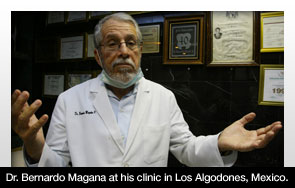 |
LOS ALGODONES, Mexico—When Bernardo Magana arrived in Los Algodones as a young dentist in 1969, he was the only dentist in town. Today this sun-drenched community of 4,000, just across the border from Yuma, Arizona, has what is likely the highest density of dentists in the world. There are more than 200 dental clinics in town and their nearly wall-to-wall billboards and barkers colorfully promote their services.
People flock to the town—nicknamed Molar City—from all across Canada and the United States for one reason only: The dental services are significantly cheaper than in their hometowns.
Magana, 70, wound up here mainly by accident. He was doing mandatory volunteer dental service in a nearby community after finishing his dental degree at the National Autonomous University of Mexico in Mexico City and was looking around for a community to open his first practice. The others all came later.
The amiable Magana says business was good even back then. His first day he had seven customers.
He blames himself for the influx of dentists in his wake.
“I started hiring too many people,” he says, chuckling at his own joke. “I brought another dentist with me and it was grow, grow, grow. Now there are probably 500 dentists in town. They are working, five or seven of them, in one office.”
Many of the dentists Magana trained now compete directly with him for the lucrative tourist dollars.
Magana has 7 dentists in his practice and all but 2 are specialized. He is the practice’s oral surgeon and its expert at installing implants.
While he is the elder statesman of dentistry in Los Algodones, his work has also spread across the nation.
Last year he received the award for the best dentist in the country.
“I know I am not the best,” he says. “I know that, but they gave it to me. It’s more of a lifetime achievement award.”
He is also a member of the ADA and was chosen by Mexican authorities to sit on the NAFTA certification committee of the Mexican Dental Association.
He contends there is no difference between the quality of his work and the quality of the care provided by dentists in Canada and the United States.
“The only difference is the price of the job,” he says. “Everybody works with gloves and a mask. The technology is the same. Some of our equipment is the newest available.”
He won’t go so far as to say all his colleagues in Los Algodones practice to the same standard.
“In this town you will find mostly good dentists, some of the best dentists in the country and quite a few that I won’t say anything about,” he says diplomatically.
His son, Bernado Magana Jr, who works with him in his practice is far more blunt.
“There are a lot of bad dentists here,” he says. “They are just out to make a buck and have poor skills. When people from the United States come here for cheap dental treatment, mostly, that is what they get. Others do as good quality dental work as in the US.”
The elder Magana’s scholastic certificates of achievement line the walls of his clinic, but probably none carries more significance for him than the 1974 article about him in Newsweek, an issue with folksinger Bob Dylan on its cover.
His office, which he shares with his son, features 2 large ceramic busts and a Mexican saddle. It turns out the colorful Magana is also a rancher and a date grower and exporter.
“I do what I do in this town from 8 am to 4 pm and from 4 pm to 9 pm I am a farmer,” he explains. “At this moment we are harvesting dates by hand and cutting cotton by machine.”
About 200 people work for Magana in one capacity or another.
He initially built the large, marble-walled dental office in Los Algodones in 1973, but he says he was stripped of all his acquired wealth in 1990 when he was kidnapped by bandits.
“My wife paid for me,” he said. “When I left the kidnappers, I had nothing left in the bank. After that I started again. I increased my farm and I grow the best dates in the world.”
Magana says he was grabbed about 12 kilometers from town when he was on the way to his ranch near the Colorado River. He was held about a month with his hands tied behind his back, not knowing if he would live or die. The conditions were grim: “No water, no showers, no breakfast,” he said.
“You are not human to these people,” he says. “You are only merchandise.”
He credits fellow dentist Carlos Rubio with helping his family in his hour of need.
“Dr. Rubio is an excellent dentist and a better human,” he says. “Some things you never forget in your life. When I fell and needed somebody to give me a hand-up, he did.”
Although Magana was an athlete and something of a boxer as a youth, claiming only two losses in 62 bouts, he is not a big man. He fought in the 110-pound flyweight division.
So these days he sticks close to home and carries a handgun when he travels.
“Always there is a .357 close to me,” he says. “I always keep it close to my right hand.”
But he maintains Los Algodones is a safe community and visitors have nothing to fear from bandits there.
“This town is the safest town in the world.”
 |


